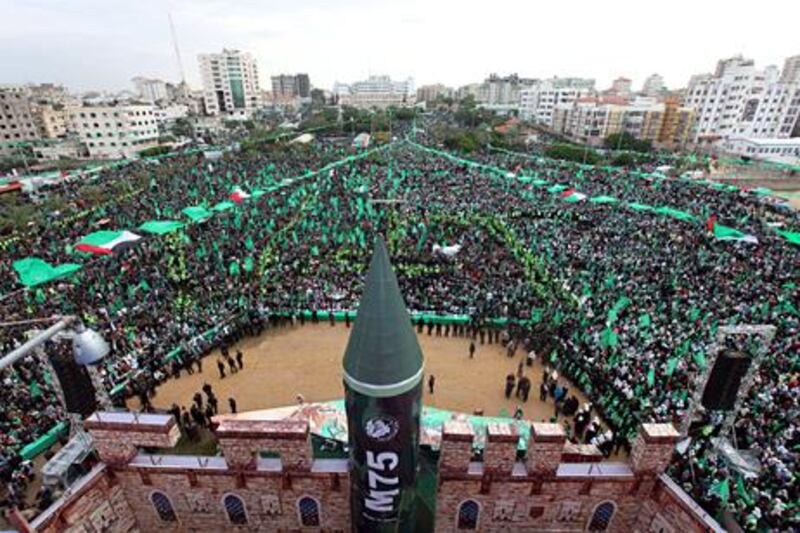GAZA CITY // Hamas's leader in exile, Khaled Meshaal, yesterday delivered a tough message on Israel during a celebration marking the Islamist group's founding 25 years ago.
Addressing tens of thousands of Palestinians bearing Hamas flags and warlike slogans, Mr Meshaal said the viability of a Palestinian state had been "killed by Israel".
He also called for an end to Israel, despite his recent suggestions that Hamas could recognise the country, and for unity with the Palestine Liberation Organisation, or PLO.
"Palestine is ours from the river to the sea and from the south to the north," said Mr Meshaal, who has led the group from abroad since 1996.
"There will be no concession on an inch of the land.
"Resistance is the right way to recover our rights, as well as all forms of struggle - political, diplomatic, legal and popular, but all are senseless without resistance," he said.
On Palestinian unity, Mr Meshaal said: "We are a single authority, a single reference, and our reference is the PLO, which we want united."
Hamas does not belong to the PLO, whose chairman is the Palestinian president Mahmoud Abbas, but Mr Meshaal said a year ago it and other factions were "on the path to joining" it.
Hamas, which has traditionally called for Israel's destruction, has been emboldened by recent regional upheaval.
Crowds were as enthusiastic about celebrating the group's founding as they were its performance in an eight-day war with Israel last month.
Children waved plastic and cardboard black-and-red renditions of the rockets Hamas used to fire deep inside Israel.
Behind the stage in downtown Gaza City's Katiba Square stood a massive replica of the M-75, a homemade rocket fired at Israeli cities.
"Hamas is victorious!" shouted one of yesterday's speakers. "Our rockets flew over Ashkelon and hit Tel Aviv."
Israeli air strikes killed as many as 170 Palestinians and injured scores more during last month's clashes, but some of those in attendance yesterday, such as Heba Dokhan, 35, considered their demise a necessary sacrifice.
"It's the price we pay for victory," said the housewife from Gaza's Nuseirat refugee camp while standing with her six children and husband.
Hamas is an organisation still in flux since its days as a social-welfare outfit created with Israeli encouragement as a counter to secular Palestinian groups.
By the time of the founding of the Islamic Resistance Movement, or Hamas, in 1987, it had evolved into a militant group. It later became known primarily for perfecting the use of suicide bombings.
Those had devastating human costs for both sides. Palestinians suffered Israeli reprisal attacks during the second intifada, or uprising, that began in 2000 and an Israeli invasion of Gaza in December 2008 that was partly billed as an attempt to thwart Hamas-fired rockets.
Hamas's rise also helped drive infighting. After a brief war five years ago, the group wrested control of Gaza from Fatah, which runs the West Bank's Palestinian Authority. That bitterly split the Palestinian leadership, and subsequent attempts to heal the rift have failed.
Now, buffeted by the winds of the Arab Spring and keen on consolidating its power in the coastal enclave, the group has also been juggling shifting foreign alliances with Iran, Syria and Egypt.
Mr Meshaal dismantled the group's Damascus headquarters last year because of dismay over a brutal crackdown of an uprising there by the regime of Syrian president, Bashar Al Assad.
Egypt, Turkey and Qatar, in turn, have tried to steer the Palestinian Islamists in their orbit. Doha has promised US$400 million (Dh1.4 billion) in development aid for Gaza. Cairo, with the apparent backing of Washington, has sought to help end the group's political and diplomatic isolation by moderating its politics.
Talal Okal, an independent analyst in Gaza, said those countries also have been pushing for Mr Meshaal to stay on as head of Hamas's political bureau. He has said he would not run for re-election in the secret internal ballot that has been held over the last several months.
"He is backed by the Muslim Brotherhood affiliates in Qatar, Turkey and especially Egypt because he is seen as having been flexible in terms of the Palestinian cause, and he speaks like a national leader with a wide vision instead of someone whose interests are only limited to Hamas goals," he said. "I think he will try to remain Hamas' leader."
Despite yesterday's hard-line message, Mr meshaal backed a successful bid last month by his rival in Ramallah, the PA president, Mahmoud Abbas, to win the Palestinians nonmember-state recognition in the United Nations. That amounted to a tacit recognition of Israel.
Relative pragmatists turned out for the celebrations. That included a Fatah delegation and the prominent Palestinian businessman, Munib Al Masri, who helped broker a landmark Hamas-Fatah reconciliation accord in May 2011 that has since foundered.
"Today shows the Palestinians can work as one and that we can move forward with an independent state," Mr Al Masri said, adding: "I'm excited to be here."
hnaylor@thenational.ae






